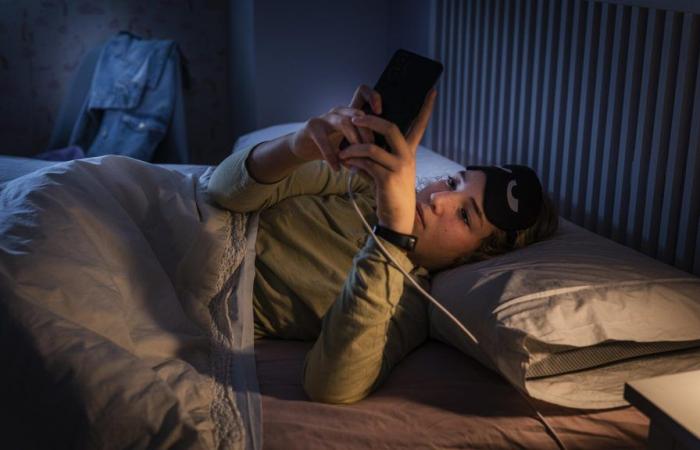fcafotodigital / Getty Images
Do you often go to bed too late? The effects are more harmful than you think
SLEEP – You already know that you probably won’t be at your best the next day when you go to bed after midnight. But beyond having a floury head, new research points to potentially worse effects: Late bedtimes can also be a problem for your mental health, especially if you often go to bed after 1 a.m.
In a recent study published in Psychiatry Research, experts analyzed sleep and health data from 73,888 British people. It found that people who regularly went to bed after 1 a.m. were more likely to suffer from mental disorders such as depression and anxiety, compared to those accustomed to falling asleep before 1 a.m. And this regardless of whether the subjects consider themselves early risers or night owls (this is what we call the chronotype).
[Note : Cet article est une traduction réalisée par la rédaction du HuffPost France, à partir d’un article paru en juin 2024 sur le Huffington Post américain. L’article original à lire ici. Il a été traduit, raccourci et édité dans un souci de compréhension pour un lectorat francophone.]
This study has certain limitations. Dr. Indira Gurubhagavatula, professor of sleep medicine at the University of Pennsylvania interviewed by the HuffPost USnotes that the people who make up the British Biobank, a medical database on which the study relies, are mostly white and middle-aged to older.
“And the way they determined your chronotype is based on a single question. As a general rule, we assess morningness or eveningness using a much more in-depth questionnaire”, explains Indira Gurubhagavatula. In other words, it’s possible that this study is downplaying whether people are truly morning or evening people, which influences the conclusions found. Additionally, the researchers relied on data related to mental health diagnoses provided by doctors. This type of data may be inaccurate or doctors may miss other diagnoses.
More impulsivity and anxiety
All this noted, Dr. Indira Gurubhagavatula notes that the results of the British study match her own conclusions. This is also what other health and sleep experts share. “Generally speaking, if you don’t go to bed until 1 or 2 a.m., it’s very likely that you won’t wake up until several hours after sunrise. And you won’t go to bed in the evening until several hours after sunset. You are therefore not in phase with the light-dark cycle of your environment, which is potentially problematic.explains Matthew Lehrer, assistant professor in the department of psychiatry at the University of Pittsburgh.
It is indeed important that our body receives strong signals indicating that it is daytime. If you don’t receive these signals or if you receive conflicting signals, it can lead to biological problems, which can also affect your brain, continues Matthew Lehrer. “Greater nighttime activity is associated with more impulsive and maladaptive behavior”he explains. “There are mechanisms in the brain related to behavior, impulsivity and inhibition… When you are awake longer and later, your abilities and your barriers tend to decrease, which could be associated with poor mental health. »
Dr. Indira Gurubhagavatula also notes that certain brain functions are more vulnerable to sleep loss than others. “The frontal lobe of the brain is very vulnerable” in particular, according to her: the part of the brain responsible for a large part of the functioning of our brain, in particular the regulation of mood and emotions.
“Our ability not to switch from one emotion to another – this ability to inhibit ourselves – is impaired in cases of sleep deprivation or very late waking”explained Mr. Gurubhagavatula. “This can lead to more negativity, more anxiety… because the higher brain functions that would regulate these emotions are dulled”.
Difficulties related to night work
This can all seem pretty daunting, especially if you have a job that often requires you to go to bed after 1 a.m. But the two experts we interviewed point out several things you can do to minimize the negative impact of a late bedtime on your workweek.
Napping is the first step. “There is the strategic nap, when you know you are in a moment where it is so difficult to stay awake that your eyes start to close. It is important, if you can, to indulge in a nap at this time, even at work, if you can of course,” and that your workplace has the necessary facilities for this, according to Dr Indira Gurubhagavatula.
“The other solution is what we call a preventive nap, to take before you take up your post. This allows you to start work as rested as possible,” adds Indira Gurubhagavatula, specifying that it is best to limit the duration of the nap to 20 or 30 minutes.
Another strategy for night shift workers is to “expose yourself to bright light at an appropriate time during working hours, if possible”according to Matthew Lehrer. “There are artificial lights, like light boxes designed for people with seasonal affective disorder. They are very bright and have fatigue-reducing and mood-enhancing properties. »
It is also important to stick to a specific eating schedule. “Maintaining a fixed meal schedule during the day can also be helpful, potentially for mood. This was demonstrated in a night work simulation. The people in the lab ate their meals during the day and their mood improved compared to those who ate at night.explains Dr. Lehrer.
Finally, according to both experts, a cool, dark, quiet bedroom can also help you sleep better. Additionally, if you can’t get the recommended seven to nine hours of sleep, Gurubhagavatula says it’s important to know that you might have a sleep disorder. “I think most people are starting to understand that sleep is not a bonus, but is actually essential. It is a biological necessity. We cannot do without it, just like air, food and water. » In such cases, it is advisable to consult a sleep specialist.
Also see on HuffPost:
Reading this content may result in cookies being placed by the third party operator who hosts it. Taking into account the choices you have expressed regarding the deposit of cookies, we have blocked the display of this content. If you wish to access it, you must accept the “Third Party Content” category of cookies by clicking on the button below.
Play Video






